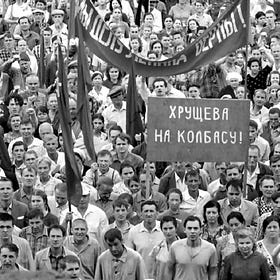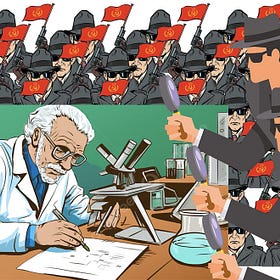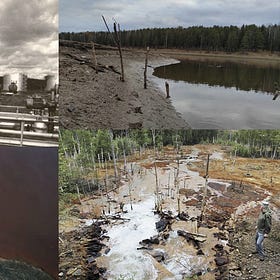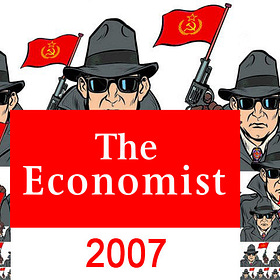What does it mean a 'chekist'? Hunter of men, women and children.
Men who theorize, who find sponsors, who carry out with fanaticism the ideology of chasing other men in the name of their own power that ends with the banality: killing and plundering
WHO CREATED putin? ENG / ITA / RUS: Who helped, lobbied, collaborated, still helping, still collaborating and still sponsoring chekist regime? - List of 40+ articles from different authors, newspapers, countries
Russian Opposition: Who, What and How ENG/ ITA/ RUS: The History of Protests, Soviet Dissidents and Opposition Leaders. 25+ articles from different authors and newspapers
Читать на русском языке: Что значит чекист? Охотник за мужчинами, женщинами и детьми
Leggere in italiano: Cosa significa un 'chekista'? Cacciatore di uomini, donne e bambini
Several people in Italy have asked me: what exactly the word "chekist" means and why I use this word to define all those who work for the KGBistan dictatorial regime which have occupied Russia. I decided to write an explanatory article, like a time ago I wrote the article What does it mean KGBistan?
The term chekist has different levels of meaning.
The first, the historical one relating to the organization CheKa (CeKa, ČeKa) - the abbreviation of VeCheka - "Pan-Russian Extraordinary Committee to combat counter-revolution and sabotage" - secret police created by Lenin with the decree of December 20, 1917. Officials of this structure they were called chekists.
The second level includes the extension of the term "chekist" to all intelligence, surveillance, espionage, counterespionage, internal security organizations created in the first decades after the revolution and their evolution. Among which are VCheKa (1917—1922), GPU together with NKVD RSFSR (1922—1923), OGPU (1923—1934), NKVD-NKGB USSR (1934—1943), NKGB-MGB USSR (1943—1953), NKGB-MGB RSFSR (1941, 1943—1953), KGB USSR (1954—1991), KGB RSFSR (1955—1965), GUGB, MVD, SVR, GRU, FSB etc etc…
The third level concerns the mentality of the person who is recruited to carry out the work of a chekist.
But what job is it?
The Chekists were executors of the gang of terrorists who had usurped power in the country, calling themselves communists and planning to establish a "dictatorship of the proletariat" throughout the world (this explains the symbol of the Comintern - the globe, without borders, where the land covered in blood). Even if the founding head of the CheKa Iron Felix dreamed in his free time and tried to become an oilman, then for all other ordinary chekists it was about work: to find, isolate and execute all those who did not agree with the authorities today and who could become traitors and enemies the day after. Real or potential enemies.
They had to eradicate dissent, written, said, done, hypothesizing even thought - terminating or imprisoning the author of it. A real witch hunt.
Chekism as a pathological aberration
An executioner's mentality, devoid of empathy, devoid of reflection and sharing of humanitarian principles, light years away from being able to generate something similar to the Universal Declaration of Human Rights, devoid of perception of democratic foundations but full of the desire to violate the private space of other living beings to be able to analyze and evaluate whether the individual belongs to a category considered more or less entitled to exist. The authorization for them to proceed is obviously issued by those who have taken superior power.
A chekist mentality has at its base a defect, a lack of something essential, a rupture and a suffering that seeks the exit and resolution of the slight or extreme intolerance in the elimination or creation of the state of punishment to another living being just because different.
Diversity in any form they sense as a threat.
A chekist does not spend sleepless nights composing a magnificent musical opera, but will spy on a composer/ singer/ musician to see if his creations damage the established order. And if the music doesn't match the criteria decided by the supreme power, he will go and arrest him.
.
A chekist does not look for a nice place in the meadow to paint a picture, just as he does not work on a block of marble to sculpt a structure, but he will spy on an artist and sculptor, he will destroy the works, set fire to the studio and arrest the artists that do not conform.
.
A chekist doesn't suffer to create poetry, but he will spy on a poet, he will read every comma to find the danger and after finding it, he will go and arrest the poet or perhaps will kill him.
.
A chekist doesn't spend years writing a novel and bequeathing it to future generations, but he will spy on a writer, his friends and acquaintances because some of them could be a spy. He will go and arrest him as soon as he is convinced that words are dangerous and that not everyone has the right to say and write what they think.
.
A chekist is not part of the cinematograph world, and he will not create a film - neither documentary nor science fiction, but he will spy on a director/ screenwriter and find scenes and words that are a threat and therefore there must necessarily be an arrest.
.
A chekist does not create any design, does not do any architecture work, does not work on any engineer project, does not plan cities but will start spying on a designer, architect, engineer and will certainly find the insubordination which will be followed by an arrest.
.
A chekist does not make scientific discoveries, but will spy on a scientist and will go and arrest him saying that he has sold military secrets abroad.
.
A chekist doesn't dream of becoming a doctor, a surgeon to save human lives, but he will spy on a doctor and find danger in his activity.
.
A chekist does not deal with humanitarian projects and does not visit orphanages or prisons, but will start spying on any volunteer to accuse him of acting on behalf of a foreign government, threatening national security.
.
A chekist does not carry out animal rescue missions in a burning forest, but he will spy on those who do and will find their activity full of dangers for the State in which he works.
.
A chekist does not plow the field and does not grow the wheat, but he will start spying on a farmer and when he sees his strength which derives from his independence from the State he will go and arrest him and seize his property.
.
A chekist does not create a company and does not trade, but will start spying on an entrepreneur, and discovering that the free market represents a threat to the power of the state, he will be ready to arrest not only this entrepreneur but everyone to nationalize and expropriate all their properties to eradicate the danger at its root.
.
A chekist does not open the pastry shop, ice cream ship, bar, restaurant to delight customers with exquisite tastes, but he will spy on the ice cream seller or restaurateur if by chance conspirators gather in his place. If so, the place will be closed and the owner will be arrested.
.
A chekist does not think about opening a museum to perpetuate various historical events, because the memory of the past and the horrors that occurred creates a reasonable, thinking person who can disobey, who can protect his interests, the interests of his family, his professional community or even the interests of an entire region - and this is a threat to the State. A chekist will destroy the historical truth and also those who research for it, or telling it. A chekist will distort it, in order to also turn himself from an executioner and punisher into either a hero-liberator or a victim of foreign enemies, and all this in order to remain in power and continue his criminal activities, which will not be followed by exposure and punishment.
106 years of chekists power in Russia. The results ?
— did and do extrajudicial executions,
— even of children or they have been placed in concentration camps; now children taken out of Ukraine and separated from their parents are also kept in different camps,
— in more recent times they jailed teenagers (the case of the attack on the FSB building inside the virtual game),
— jailed dissidents in concentration camps,
— or in clinics where they practiced punitive psychiatry,
— with tanks crushed hungry people who protested against low salaries,
— in between one atrocity and another they called painter-propagandists to paint the doves and organized the Great Peace Marches all over the world against American imperialism,
— killed enemies in foreign countries,
— killed Christian priests, persecuted and repressed religions other than those serving the interest of the State,
— they killed the journalists,
— killed opposition politicians,
— they killed former colleagues who told the truth of their crimes or had only intentions of revealing their secrets by confessing to the wrong person,
— blew up buildings with their own citizens sleeping inside (same as they do now in Ukraine) and then killed those who were investigating, cheated survivors, and threatened all those who wanted to know the truth ans was asking questions.
— created fake “terrorist groups” to justify killings in the name of national security,
— used their power to plunder the riches of the country and rob the population,
— by depredating the country they polluted the environment, created ecological catastrophes and ecocide,
— closed museums, art galleries, libraries, schools, kindergartens and universities,
— have destroyed the judicial system and the rule of law by replacing it with the system of judges loyal to them ready to convict any person on any false charges,
— violated the rights of all categories of citizens by robbing and depriving everyone of orphans, invalids, war veterans and ordinary pensioners by maintaining and protecting the privileges of the usurping circle and their collaborators.
Is it enough?
Chekism as an international phenomenon
Any intelligence agency without control of civic society risks degenerating into "chekism" by dramatically increasing its power and transcending the goals and rules for which it was created.
Budgets create bureaucracies. And large budgets create bureaucratic empires that begin to fight not only for their own existence, but also to provide conditions that eliminate the dangers of survival. The survival of bureaucratic empires depends on a handful of those with the highest power. By serving a handful of these people, concluding shady deals with them that cover up the crimes of these officials, in return, there is a guaranteed receipt of the budgets necessary for existence.
But there remain ordinary people, a society that supports bureaucrats with its daily work and taxes. And dissatisfied with the decrease in their income, they can begin to protest, organize strikes and demand cuts in the budgets of the bureaucracy and increase the efficiency of their work.
Once again, the bureaucracy faces a threat to its existence and survival. To protect themselves, they must anticipate citizen protests, know in advance, and suppress them as quickly as possible.
Change can threaten the survival of state agencies and officials, so to protect themselves they must anticipate citizen protests and crack them down sooner. To prevent you need to know in advance.
To know in advance, they need to spy. Over society.
Testimony from Edward Snowden and other whistleblowers revealed ongoing mass surveillance of citizens in the United States, as well as the spread of spying on foreign politicians and journalists.
Unfortunately, the secret services in the United States have the same chekist mindset as in Russia or China. And the same thing is starting to happen in Europe, where bureaucrats appointed by other bureaucrats are putting forward proposals to combat disinformation, hate speech, national security, etc., and all of this, as already noted, is practiced by officials who have chosen chekism as a vector movements to increase power and survive at any cost.
Irine Kuklina
11.09.2023
"You are looking at the most dangerous animal in the world. It alone of all the animals that ever lived can exterminate (and has) entire species of animals. Now it has the power to wipe out all life on earth."
The story ran in the Illustrated London News on June 8, 1963, which provided some more context: "In the Great Apes House at the New York Zoo is to be seen an exhibit of great interest and one which speaks for itself. The exhibit in question is that of 'The Most Dangerous Animal in the World' and it is handled by the Zoo authorities with not unsubtle deftness. Between the Orang-Utan and Mountain Gorilla cages is a compartment with bars and the legend which can be read in the photograph above: Visitors, attracted by the proclamation at the top of the cage, stop and peer into the cage. What they see is, without a doubt, the most dangerous animal in the world, and the frequent comment by visitors is 'It's true!' for they are looking into a barred mirror. And there is considerable truth in this simple, but effective statement that is made."
Below you can find a list of articles translated by me from Russian to Italian language on the topic of "Chekism" as it manifested itself in various aspects in the USSR and putin's Russia:
"There is no name worse than mine" /
"Non c'e nome peggiore del mio"...
Di seguito la traduzione integrale dell’articolo: «Нет имени страшнее моего» | Leonid Mlechin | Novaya Gazeta | 24.02.2021 | https://novayagazeta.ru/articles/2021/02/24/89361-net-imeni-strashnee-moego? "Non c'è nome peggiore del mio" Dzerzhinsky, arrogandosi il diritto di giustiziare e perdonare, ha creato un sistema di completa ingiustizia
Crimes of the USSR: September 5, 1918 - the beginning of the Red Terror /
Crimini dell'URSS: 5 settembre 1918 - l'inizio del Terrore Rosso
Crimini dell'URSS: 15 aprile 1919 - L'inizio del GULAG Crimini dell'URSS: 31 luglio 1937 - l'inizio del Grande Terrore
Crimes of the USSR: April 15, 1919 - The beginning of the GULAG /
Crimini dell'URSS: 15 aprile 1919 - L'inizio del GULAG
104 anni fa, i campi di lavoro forzato furono istituiti ufficialmente nella RSFSR - Russia sovietica. Fino al 1929 fu usato il termine "campo di concentramento", quando in una riunione del Politburo fu ribattezzato in "campo di lavoro correttivo". Alla fine del 1919 in Russia c'erano 21 campi e alla fine del 1921 gia 122. In totale sono stati piu di 18 …
Crimes of the USSR: May 30, 1921 - Bonch-Bruevich's letter to Lenin - The persecution of small communities /
Crimini dell'URSS: 30 maggio 1921 - La lettera di Bonch-Bruevich a Lenin - La persecuzione delle piccole comunità
Crimini dell'URSS: 15 aprile 1919 - L'inizio del GULAG Crimini dell'URSS: 31 luglio 1937 - l'inizio del Grande Terrore
Crimes of the USSR: The first Chekist tried to become the oil oligarch /
Crimini dell'URSS: Il primo chekista tentava di diventare l'oligarca petroliere
Crimini dell'URSS: 15 aprile 1919 - L'inizio del GULAG Crimini dell'URSS: Chekisti, bolshevichi e Stalin - crimini contro i bambini.
Crimes of the USSR: Chekists, Bolsheviks and Stalin - crimes against children /
Crimini dell'URSS: Chekisti, bolshevichi e Stalin - crimini contro i bambini.
“I discorsi della borghesia sulla famiglia e sull'educazione, sulle delicate relazioni tra genitori e bambini ispirano ancora più disgusto, mentre più legami familiari vengono distrutti tra il proletariato a causa dello sviluppo della grande industria, più bambini si trasformano in semplici oggetti commerciali e strumenti di lavoro.”
Crimes of the USSR: Punitive psychiatry /
Crimini dell'URSS: Psichiatria punitiva
Crimini dell'URSS: 15 aprile 1919 - L'inizio del GULAG L'opposizione russa: 30 aprile 1968 - La Cronaca degli Eventi Correnti. La nascita della prima gazzetta samizdat nell'URSS Una delle pagine nere dell’Unione Sovietica è stata interrota nel 1988 (adesso ripresa dal regime chekista di nuovo) con
Crimes of the USSR: May 27, 1935 - Creation of the NKVD "troika" - extrajudicial execution /
Crimini dell'URSS: 27 maggio 1935 - Creazione della "troika" NKVD - esecuzione extragiudiziale
Crimini dell'URSS: 15 aprile 1919 - L'inizio del GULAG Crimini dell'URSS: 31 luglio 1937 - l'inizio del Grande Terrore
Crimes of the USSR: July 31, 1937 - the beginning of the Great Terror /
Crimini dell'URSS: 31 luglio 1937 - l'inizio del Grande Terrore
Leggere anche: Crimini dell'URSS: 15 aprile 1919 - L'inizio del GULAG Crimini dell'URSS: 30 maggio 1921 - La lettera di Bonch-Bruevich a Lenin - La persecuzione delle piccole comunità Crimini dell'URSS: 27 maggio 1935 - Creazi…
Crimes of the USSR: June 2, 1962 - the massacre of Protestants in Novocherkassk /
Crimini dell'URSS: 2 giugno 1962 - il massacro dei protestanti nel Novocherkassk
Il 2 giugno 1962 a Novocherkassk fu fucilata una manifestazione pacifica di lavoratori, decine di persone furono uccise e ferite. Entro il 12 giugno, gli ufficiali del KGB hanno compilato un elenco di 150 lavoratori che hanno partecipato attivamente alla protesta. 53 persone sono state immediatamente arrestate, sette erano in attesa di esecuzione.
"You Crucify Freedom, but the Human Soul Knows No Chains!" /
"Voi Crocifiggete la Libertà, ma l'Anima Umana non Conosce Catene !"
Di seguito la traduzione parziale dell’articolo-intervista: «Пришли на обыск парни, у одного фамилия Путин». История художника Юлия Рыбакова — в 70-х его посадили за надпись про свободу, а в обыске участвовал будущий президент | Anna Pyartyulyainen | Bumaga
Crimes of the USSR: Pacifism /
Crimini dell'URSS: Pacifismo
Ho fatto una traduzione parziale del testo di uno dei più famosi dissidenti sovietici, Vladimir Bukovsky. Lo scrisse nel 1982, sono passati 40 anni, ma la situazione nel mondo non è cambiata. Il regime sovietico ha cambiato il nome e la facciata, si è rianimato nella forma aggiornata del KGBistan, ha ripristinato il sistema di repressione e continua a m…
What does KGBistan mean? - Part 5: The network /
Cosa significa KGBistan?- Parte 5: La rete
Per decenni, la priorità dei legami familiari e di amicizia coltivati nel KGB sta ora creando, con la diffusione del KGB, una struttura mafiosa che non ha analoghi al mondo in termini di influenza e di numero, con i suoi pronunciati legami e interessi corporativi. Interessi geneticamente ostili sia alla democrazia che all'intellighenzia.
The twenty years of KGBistan -5- The hunt for "spy" scientists /
Il ventennio del KGBistan -5- La caccia agli scienziati-"spia"
Cosa significa KGBistan? Cosa significa KGBistan? - Parte 2: L'uomo che lo aveva predetto gia nel 1990. Cosa significa KGBistan? - Parte 3: Il ritorno della esecuzione extragiudiziale Cosa significa KGBistan? - Parte 4: Un paese per amici Cosa significa KGBistan? - Parte 5:
The twenty years of KGBistan -4- The ecological catastrophe /
Il ventennio del KGBistan -4- La catastrofe ecologica
In epoca Sovietica esisteva un filtro molto rigido per le cattive notizie: non si parlava di problemi ambientali. Zero notizie. Questa manipolazione del campo di informazioni ha provocato una forte illusione nella mente collettiva dove fi…
Kremlin and creation of the youth Comintern: Puppets for Revolutions /
Cremlino e creazione del Komintern giovanile: Pupazzi per le Rivoluzioni
Di seguito la traduzione integrale dell’articolo: Карманные революционеры | Egor Putilov | Colta | 18.09.2014 | https://www.colta.ru/articles/society/4683-karmannye-revolyutsionery Rivoluzionari da taschino Egor Putilov sull'internazionale comunista e su come la Sinistra in Russia sia diventata la base del regime
What does KGBistan mean? The Economist newspaper version, 2007 /
Cosa significa KGBistan? La versione del giornale The Economist, 2007
WHO CREATED putin? ENG / ITA / RUS: Who helped, lobbied, collaborated, still helping, still collaborating and still sponsoring chekist regime? - List of 40+ articles from different authors, newspapers, countries Cosa significa KGBistan? Cosa significa KGBistan?
The Russian opposition: 15 August 2018 - The Mothers' March /
L'opposizione russa: 15 agosto 2018 - La Marcia Delle Madri
22 luglio 1983 nasceva Kirill Tolmatskiy aka Detsl. Il cantautore contro il regime. L'opposizione russa: Marzo 2014 - proteste in diverse città contro l'invasione militare in Ucraina Russian opposition: 4th of June, 2023 - #FreeNavalny worldwide La traduzione integrale dell’articolo:
Despair and anguish in Russian society. Teachers in defense of children against military propaganda in schools /
La disperazione e l'angoscia nella società russa. Le maestre in difesa dei bambini contro la propaganda militare nella scuola
WHO CREATED putin? ENG / ITA / RUS: Who helped, lobbied, collaborated, still helping, still collaborating and still sponsoring chekist regime? - List of 40+ articles from different authors, newspapers, countries Crimini dell'URSS: Chekisti, bolshevichi e Stalin - crimini contro i bambini.
























